Dozens of enormously wealthy individuals, couples, families, or corporations have donated $1 million or more to conservative super PACs in the 2020 cycle, according to a CMD analysis of federal campaign finance data. These donors combined to give nearly $233 million to conservative super PACs, amounting to nearly 60 percent of the total money raised by the PACs.
The donations have fueled nearly $488 million in election spending by independent groups—including super PACs and “dark money” nonprofit organizations—so far in the current election cycle, according to the Center for Responsive Politics. This total, as of August 17, is less than the more than $563 million spent by outside groups at this point in the 2016 election cycle, but it’s easily the second-highest amount since the Supreme Court’s Citizens United ruling in 2010, which allowed unlimited corporate money in U.S. elections.
Of the $337 million worth of independent expenditures made so far by super PACs, liberal-leaning PACs have spent more ($194 million) than conservative PACs ($136 million). If this trend holds, it will be the first time that liberal super PACs outspend their conservative counterparts since 2014. The current discrepancy is due in part to a competitive Democratic presidential primary that saw super PACs spend tens of millions now-presumptive Democratic nominee Joe Biden, Pete Buttigieg, Sen. Elizabeth Warren (D-MA), and Sen. Amy Klobuchar (D-MN).
With the coronavirus ravaging the South and West and threatening the Midwest, President Donald Trump’s disastrous handling of the resulting health and economic crises, and GOP lawmakers scared to contradict the president, Republicans are looking at what could be a very bad November for them. Biden is consistently ahead of Trump in many battleground state polls, and a number of Republican senators’ seats are in danger. Given this dynamic, it’s likely right-wing megadonors will pour even more money into outside spending groups over the next 11 weeks before Election Day.
Forty-four individuals, couples, families, or corporations have donated $1 million or more to conservative super PACs in the 2020 cycle so far, according to a CMD analysis of federal campaign finance records.
The top ten donors to conservative super PACs during the 18-month period from 2019 through June 2020 are:
1. Elizabeth and Richard Uihlein — $35,175,000
Estimated net worth: $4 billion
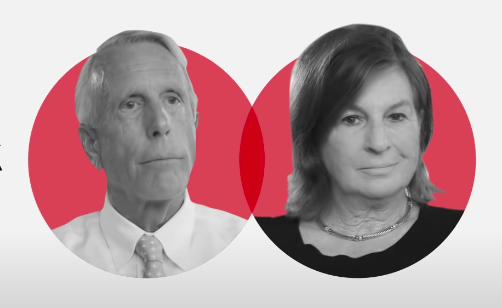
In the Trump era, shipping supply magnate Richard Uihlein and his wife, Liz, have emerged as one of the biggest Republican donors in the country. In the 2020 election cycle, the Illinois couple has poured nearly $35.2 million into six conservative super PACs. The largest amount—$16.5 million—went to Club for Growth Action, which has made $24.6 million worth of independent expenditures in federal races so far in the 2020 cycle. It has spent the most, almost $3.5 million, on the presidential race, including $2.9 million against Biden and nearly $450,000 promoting Trump. Club for Growth has spent about as much, close to $3.4 million, on the Alabama Senate race.
The Uihleins donated $9.5 million to Restoration PAC, which has spent over $4 million opposing Biden and incumbent Democratic senator Dick Durbin (IL), Doug Jones (AL), Gary Peters (MI), Jeanne Shaheen (NH), and Mark Warner (VA). Other donations include $5 million to Americas PAC, $2,775,000 to America First Action, and $1 million to House Freedom Action. Richard Uihlein is the only major donor to Americas PAC, which is spending to support GOP candidates including incumbent Sen. Joni Ernst of Iowa and Michigan Senate candidate John James (R).
In May 2016, Liz Uihlein joined Trump Victory, a joint committee that raises money for the Trump campaign and the Republican National Committee. In August of that year, she joined the Trump’s campaign economic advisory committee.
Liz Uihlein strongly objected to business closures in her state of Wisconsin. In April, she emailed staff of her family business, Uline, where she is CEO, asking that they sign a petition to recall the Democratic governor, Tony Evers, over his coronavirus-related business restrictions. “The Media is Overblowing COVID-19,” she said in a March email.
The Uihleins have backed several highly controversial GOP candidates, including accused pedophile Roy Moore and neo-Confederate sympathizer Chris McDaniel.
Image credit: New York Times/YouTube
2. Timothy Mellon — $30 million
Net worth: $1 billion
The majority owner of transportation holding company Pan Am Systems and an heir to the Mellon steel fortune, Mellon has donated $10 each to the pro-Trump super PAC America First Action, the Congressional Leadership Fund, and the Senate Leadership Fund.
Mellon used offensive racial stereotypes to describe Black Americans in his 2015 autobiography, calling social safety net programs “Slavery Redux.” In 2010, he donated $1.5 million to Arizona’s legal defense fund as it fought lawsuits over its strict anti-immigrant law SB 1070, which essentially encouraged racial profiling.
Mellon is related to the Scaife family, one of the biggest bankrollers of the right-wing movement, including several hate groups, through its family foundations.
3. Miriam and Sheldon Adelson — $26,000,000
Estimated net worth: $30.3 billion
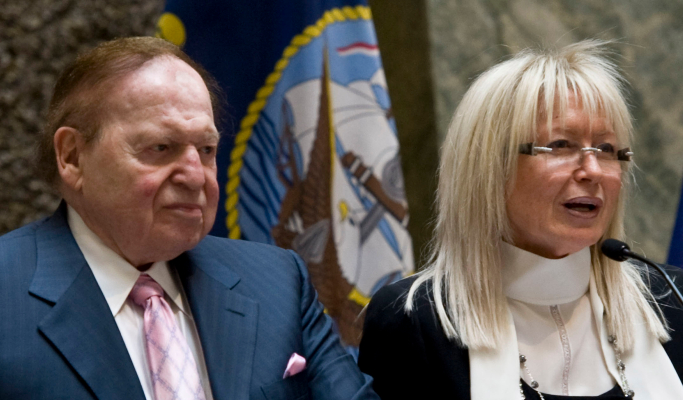
Casino magnate Sheldon Adelson and his wife, Mariam, continue being some of the Republican Party’s biggest donors. The two gave $25 million to the Senate Leadership Fund and $1 million to Security is Strength, a single-candidate super PAC backing Sen. Lindsey Graham (R-SC), who faces Democratic challenger Jaime Harrison. A recent poll showed the race tied, with independents preferring Harrison.
Image Credit: U.S. Air Force
4. Stephen Schwarzman — $16,500,000
Estimated net worth: $18.6 billion
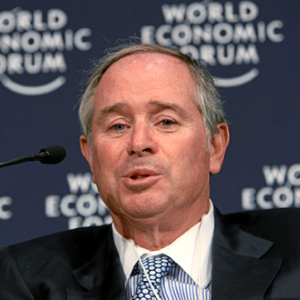
CEO of private equity giant Blackstone, Schwarzman has been one of Trump’s biggest boosters and has been advising the president on his coronavirus response, which has been disastrous. Schwarzman is a “long-time friend” of Trump’s, and he chaired the president’s Strategic and Policy Forum.
The biggest political spender on Wall Street, Schwarzman gave $3 million to America First Action, making him the super PAC’s fourth-largest donor. He donated $10 million to the Senate Leadership Fund, $2.5 million to the Congressional Leadership Fund, and $1 million to 1820 PAC, which is supporting embattled incumbent Sen. Susan Collins (R-ME), who faces challenger Sarah Gideon, the Democratic speaker of the Main House of Representatives. Collins polled behind Gideon in the two major polls that have been conducted so far.
Image credit: World Economic Forum/Flickr
5. Jeff Yass — $11,098,000
Estimated net worth: over $1 billion

Yass, the managing director of investment firm Susquehanna International Group and a board member of the libertarian Cato Institute, supported Rand Paul’s presidential bid in 2015. In the current election cycle, he has donated $7.5 million to Club for Growth Action and $3.6 million to Protect Freedom PAC, which is backing GOP congressional candidates. In 2018, the group spent over $500,000 in support of libertarian Gary Johnson’s run for Senate in New Mexico. Yass is by far the biggest donor to Protect Freedom PAC in 2020.
Image credit: Marshall Segal/Flickr
6. Koch Industries — $8,250,000
Estimated net worth (Charles Koch): $44.9 billion
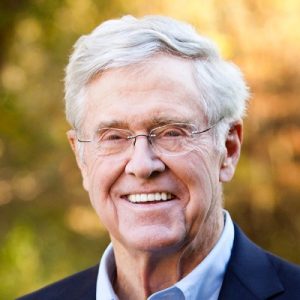
Charles Koch’s massive, private fossil fuel and materials conglomerate bankrolled the super PAC arm of his premier political organization, Americans for Prosperity. The Kansas-based company donated $7 million to AFP Action, the most of any donor, and gave $750,000 to the Senate Leadership fund and $500,000 to the Congressional Leadership Fund.
AFP has stayed out of the presidential race so far, and, as in 2016, may not spend to directly advocate for Trump’s election. However, in 2016, the Koch network spent millions on ads backing Republican Senate candidates, often with an anti-Hillary Clinton message.
7. Ken Griffin — $8,000,000
Estimated net worth: $15 billion

Citadel CEO Griffin, like his Wall Street counterpart Schwarzman, has given $1 million to the pro-Collins 1820 PAC. He gave $6.5 million to the Congressional Leadership Fund and $500,000 to Better Future MI Fund, a super PAC that has spent over $1.5 million opposing Democratic Michigan Sen. Gary Peters.
Griffin, owner of the most expensive home in U.S. history at $238 million, criticized his party’s leader in late 2018 after Trump badmouthed Jerome Powell, chair of the Federal Reserve. So far this cycle, Griffin hasn’t given to super PACs spending for Trump, and he hasn’t personally donated to either of Trump’s presidential campaigns.
8. Charles and Helen Schwab — $7,500,000
Estimated net worth: $6.9 billion
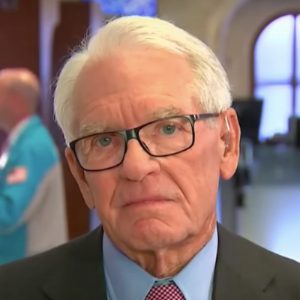
Billionaire banker Charles Schwab and his wife, Helen, combined to give $6 million to the Senate Leadership Fund, $1 million to the Congressional Leadership Fund, and $500,000 to the WFW Action Fund, a super PAC that spent mostly on a hotly contested Republican runoff election in North Carolina’s 3rd Congressional District in 2019.
Schwab’s company, the Charles Schwab Corporation, donated the maximum of $101,700 to the Republican National Committee’s Legal Proceedings Account, which spent heavily to defend Trump against Russia-related allegations.
Image credit: CNBC/YouTube
9. Geoffrey H. Palmer — $7,400,000
Estimated net worth: $3 billion (2016)
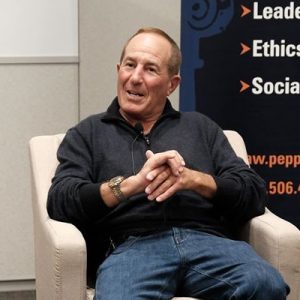
Los Angeles real estate developer Palmer is America First Action’s second-biggest donor to date, having given $6 million. Palmer also added $1 million to the Senate Leadership Fund and $400,000 to the Congressional Leadership Fund.
Like Trump, Palmer, who donated millions to a pro-Trump super PAC in 2016, has a history of shady dealings and lawsuits against him. He has called California’s affordable housing requirements “immoral” and “not American.”
In September 2019, Palmer hosted a Trump fundraiser, which the president attended, at his Beverly Hills mansion.
Image credit: Palmer Center for Entrepreneurship and Law, Pepperdine University/Facebook
10. Warren A. Stephens — $7,250,000
Estimated net worth: $2.6 billion
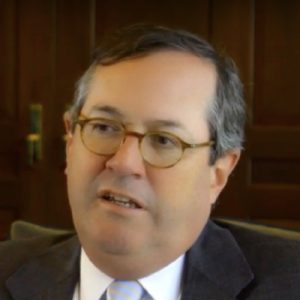
Stephens was once a “Never Trumper.” But it didn’t take long for the Arkansas private equity billionaire to change course; by 2018, he had donated six figures to America First Action.
In the present election cycle, he has given $1.5 million to America First Action and nearly $6 million more to eight additional super PACs. Like multiple fellow financial industry billionaires, Stephen contributed $1 million to the pro-Collins 1820 PAC.
Image credit: Roby Brock/YouTube
Additional Megadonors
Other notable donors include the billionaire family of Education Secretary Betsy DeVos. Six members, including her husband, Dick, combined to donate $3.5 million to four super PACs: the Senate Leadership Fund ($1.2 million), America First Action ($1 million), Better Future MI Fund ($700,000), and the Congressional Leadership Fund ($600,000).
More Trump officials have bankrolled the political operations working towards his re-election, including Linda McMahon, the former Small Business Administration head who is now chair of America First Action (over $4 million to the group), and the U.S. ambassador of the United Kingdom, Woody Johnson, who gave $1 million to America First Action.
In addition to Koch Industries, several other fossil fuel companies have given big to GOP super PACs. Chevron ($3.4 million), Valero ($1.5 million), ConocoPhillips ($1.25 million), and Energy Transfer ($1 million) have all donated $1 million or more to conservative super PACs. Hillwood Development, a real estate firm owned by the Perot family, which also owns oil and energy companies, donated $3.1 million to three super PACs, including $1 million to Engage Texas, a group focused on voter registration.
Feature image includes cropped images from The New York Times/Youtube, CNBC/YouTube, World Economic Forum/Flickr, and the U.S Air Force.


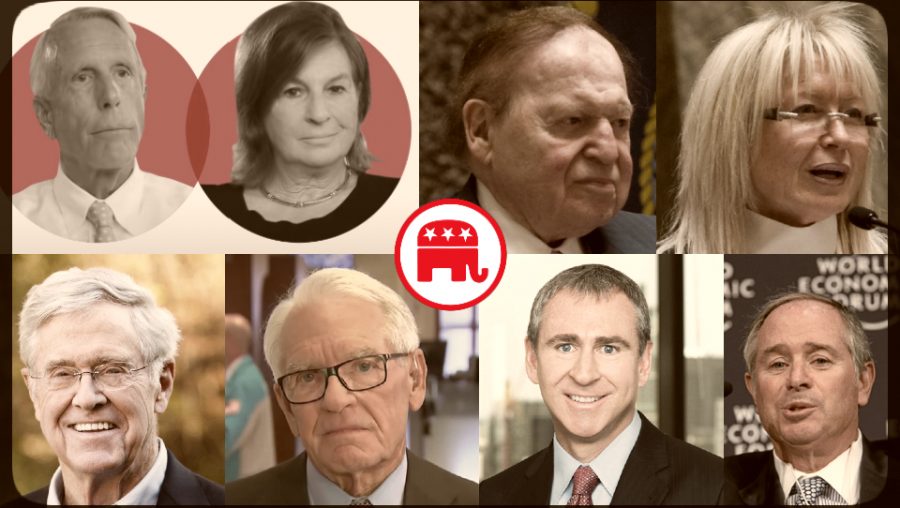
Wonder why they are so ugly? No life in their faces.